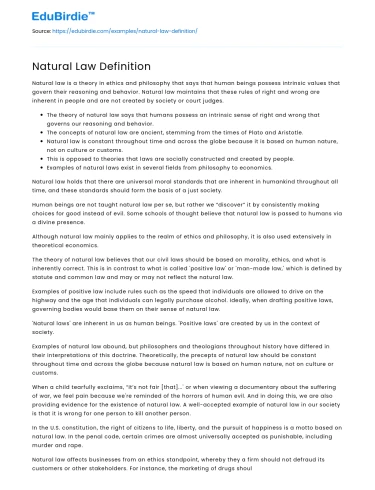Natural law is a theory in ethics and philosophy that says that human beings possess intrinsic values that govern their reasoning and behavior. Natural law maintains that these rules of right and wrong are inherent in people and are not created by society or court judges.
- The theory of natural law says that humans possess an intrinsic sense of right and wrong that governs our reasoning and behavior.
- The concepts of natural law are ancient, stemming from the times of Plato and Aristotle.
- Natural law is constant throughout time and across the globe because it is based on human nature, not on culture or customs.
- This is opposed to theories that laws are socially constructed and created by people.
- Examples of natural laws exist in several fields from philosophy to economics.
Natural law holds that there are universal moral standards that are inherent in humankind throughout all time, and these standards should form the basis of a just society.
Save your time!
We can take care of your essay
- Proper editing and formatting
- Free revision, title page, and bibliography
- Flexible prices and money-back guarantee
Human beings are not taught natural law per se, but rather we “discover” it by consistently making choices for good instead of evil. Some schools of thought believe that natural law is passed to humans via a divine presence.
Although natural law mainly applies to the realm of ethics and philosophy, it is also used extensively in theoretical economics.
The theory of natural law believes that our civil laws should be based on morality, ethics, and what is inherently correct. This is in contrast to what is called 'positive law' or 'man-made law,' which is defined by statute and common law and may or may not reflect the natural law.
Examples of positive law include rules such as the speed that individuals are allowed to drive on the highway and the age that individuals can legally purchase alcohol. Ideally, when drafting positive laws, governing bodies would base them on their sense of natural law.
'Natural laws' are inherent in us as human beings. 'Positive laws' are created by us in the context of society.
Examples of natural law abound, but philosophers and theologians throughout history have differed in their interpretations of this doctrine. Theoretically, the precepts of natural law should be constant throughout time and across the globe because natural law is based on human nature, not on culture or customs.
When a child tearfully exclaims, “It’s not fair [that]...' or when viewing a documentary about the suffering of war, we feel pain because we're reminded of the horrors of human evil. And in doing this, we are also providing evidence for the existence of natural law. A well-accepted example of natural law in our society is that it is wrong for one person to kill another person.
In the U.S. constitution, the right of citizens to life, liberty, and the pursuit of happiness is a motto based on natural law. In the penal code, certain crimes are almost universally accepted as punishable, including murder and rape.
Natural law affects businesses from an ethics standpoint, whereby they a firm should not defraud its customers or other stakeholders. For instance, the marketing of drugs should be made with full disclosure of potential harms and not be sold as 'snake oil.'
Since natural law assumes universalizing rules, it does not account for the fact that different people or different cultures may view the world differently. For instance, if people interpret differently what it means for something to be fair or just, the results will differ.






 Stuck on your essay?
Stuck on your essay?

